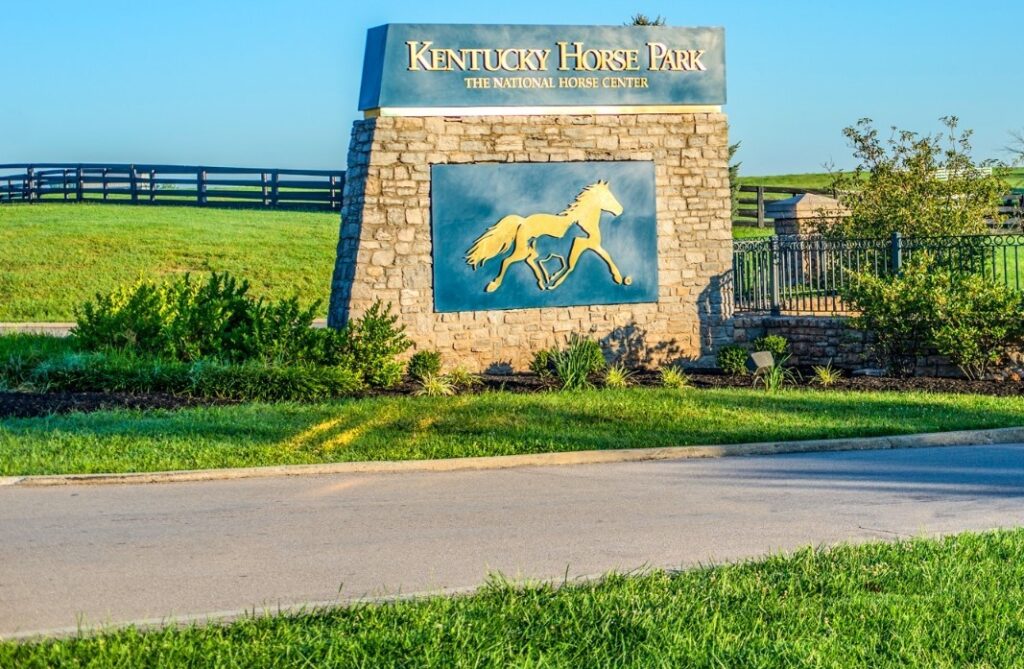
To bring awareness to the importance of veterinary care and the success of mounted police horses, we conducted an exclusive interview with Kentucky Horse Parks’ Sheila Forbes, Equine Operations, to dive deeper into the impact this supplement has had on their horses.
The Kentucky Horse Park’s Mounted Police Program stands as an excellent example to why it is important to take care of your horse’s joints and health. The success of this program relies heavily on the impeccable care and management of these equine officers. Sheila shares the details of the health and wellness routine below.
EQ: Can you provide an overview of the Kentucky Horse Park Mounted Police Program and its mission and objectives?
Sheila: The Mounted Police unit plays an important part at the Kentucky Horse Park. They patrol both mounted and unmounted 24 hours a day 365 days a year. They not only serve as ambassadors with their equine mounts but they also provide security for the entire facility. They enforce all Kentucky laws at the park including traffic and parking control, criminal complaints, executing active warrants, serve as trained first responders, etc. Our Mounted Police Captain, Lisa Rakes, is not only an exceptional office but also an accomplished horsewoman. She oversees her unit of up to 10 full time officers and the mounted police herd which consists of 10 very special horses. The mounted police unit also regularly provides color guard and flag service at many of our major events and community activities.
EQ: What role do horses play within the Mounted Police Program, and how are they utilized in law enforcement activities?
Sheila: Our herd consists of 10 mainly draft cross horses. As you can imagine, it takes a very special horse to be able to handle the crowds, traffic and commotion that they horses often deal with. Our horses are trained in various techniques such as crowd control where they can actually push back a large crowd if requires. In fact our officers organize and host the National Mounted Police Colloquium where they will train officers and their mounts from all over the country in equine police work and skills. They not only patrol on park but also large events such as the KY State Fair if required. They are trained to handle loud noises such as fireworks, pyrotech, gun shots, etc. On park they spend a lot of their time patrolling the grounds. During this time they monitor parking, assist in providing directions to guests, direct traffic and of course get the occasional petting and photo sessions from visitors and competitors.
EQ: What type of work do the horses do, maybe a brief look at their average day?

Sheila: The horses that are assigned patrol for that day typically are brought in from their fields around 8 am. Those not on patrol will enjoy a nice day outside in their field. Our Mounted Police Barn is a working barn but they give daily tours as well. Horses are fed, groomed and tacked up for their various assignments during the day. Even on quiet days the horses will enjoy a long walk for exercise and enrichment every day. Our mounted unit can carry portable computers in their saddle bags and are able to issue parking tickets and warnings directly from horse back during the day. Unless there is a large event going on, the horses typically end their patrol day around 3 pm. They are groomed, fed and then turned back out in their field for the evening. Officers utilize police cruisers to patrol at night.
EQ: Horse welfare and pain management are crucial aspects of any equestrian program. Could you describe the measures you take to ensure the well-being of your horses, particularly in terms of pain management?
Sheila: The age of the MP unit ranges from 8 to 18 so each horse has a unique set of health and pain management requirements. All MP horses are fully shod to protect their hooves from the concrete and percussion. We are very fortunate to have a fairly healthy herd. We specifically monitor lameness closely as they horses travel a lot of miles per day while on patrol. Some of the old horses require additional joint support to keep them comfortable on concrete and hard surfaces. Whenever possible we prefer to keep the horses comfortable without the use of NSAIDS.
EQ: What common sources of pain or discomfort do the horses in your program encounter, and how do you identify and address these issues?
Sheila: Typically we encounter various lameness and joint issues. Thankfully most of them have proved to be mild and treated with time and support. We also encounter the typical body sore issues that may occur from patrolling on hard surfaces. We work closely with our vets, chiropractors and farriers to change shoeing as needed or implement supportive care such as stall rest when needed, etc. The most important thing is the bond the officers have with their partner horses. They are very familiar and in-tune with their partners and are able to easily recognize when something is off or the horse is sore. Because the horses are shod nearly year round, hoof health is also very important to us.
EQ: Could you share the types of training and conditioning programs you have in place to keep the horses fit and minimize the risk of injuries?
Being in the bluegrass means we typically have green and lush fields. This can be problematic for horses and balancing nutrition and weight is something we monitor closely. Our horses are weighed every month by an equine nutritionist so we can actually monitor their weight to the pound and nutritional adjustments can be made as needed. Extra weight is address stress to the horses joints so we want to avoid that. We do utilize muzzles as well. In addition the police horses have a pretty strict routine for conditioning exercise. Even when the park is closed, the horses will still patrol their route to ensure they are getting adequate exercise and “all their steps in” to maintain their level of fitness.
EQ: How do you ensure that the horses are comfortable and pain-free during their duty hours, especially when participating in parades, crowd control, or other physically demanding activities?
Sheila: The key is the relationship the officers have with their mounts. They can quickly feel if “something just isn’t right”. If we feel like the horse is off or not acting normal they are taken out of patrol rotation and we immediately begin to problem solve or consult with our vets. Horses are like people and sometimes they just have an off day. However we all know an “off day” can quickly turn into an emergency with horses so everything is monitored to be sure they are not trying to tell us something is seriously wrong. Sticking to a routine is also very important. Our horses are fed on a routine, groomed and tacked up in a routine, turned in/out at specific times, shod on a regular routine, etc. We routinely run fecal test to monitor for parasites, and give yearly vaccinations at approximately the same time every year.
EQ: Can you discuss any special considerations or adaptations you make for older horses?
Sheila: There are several things we consider with our older horses. They are monitored for metabolic issues or Thyroid issues every year. We will run a blood test to make sure they are maintaining normal insulin levels and if not, we will adjust their nutrition or add a metabolic treatment medicine. We are also more aware of our older horses in the summer when the weather is hot and humid. Being draft crosses they have the tendency to overheat fairly easily. Older horses may have a more difficult time of regulating their body heat so on hot days their patrol may be shorter and more breaks taken in shady areas. We also keep the horses on daily electrolytes to aid with hydration.

EQ: Finally, could you share any success stories or experiences that highlight the positive impact of your pain management approach on the overall health and performance of your horses?
Sheila:
The Kentucky Horse Park’s Mounted Police Program not only showcases the essential role of horses in law enforcement but also emphasizes the critical nature of the meticulous care for their well-being. Through stringent routines, personalized attention, top-of-line healthcare products such as Bute-Less, and a strong partnership between officers and their mounts, the program stands as a testament to the positive impact exceptional equine healthcare has on their performance.
Article sponsored by:


